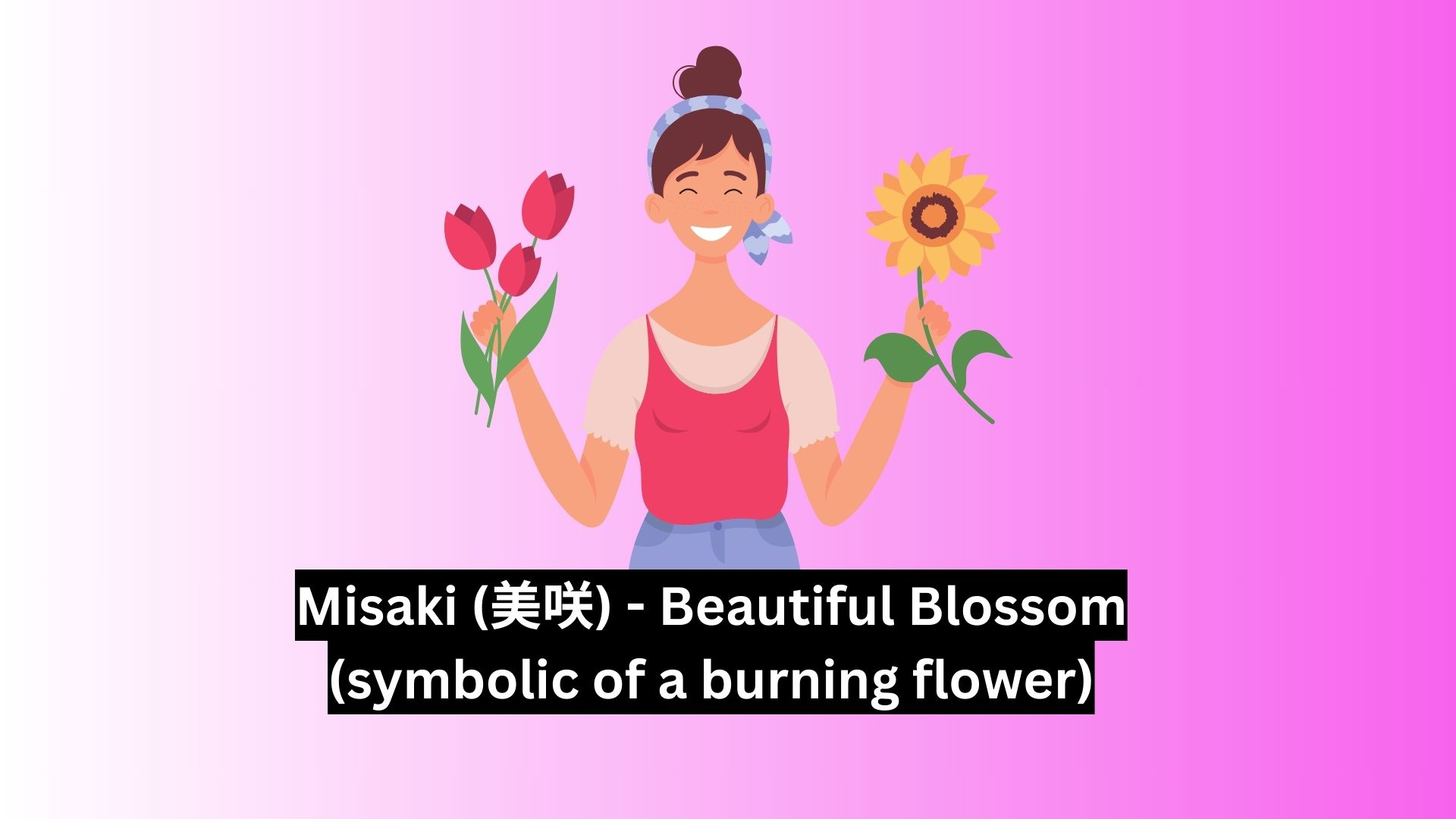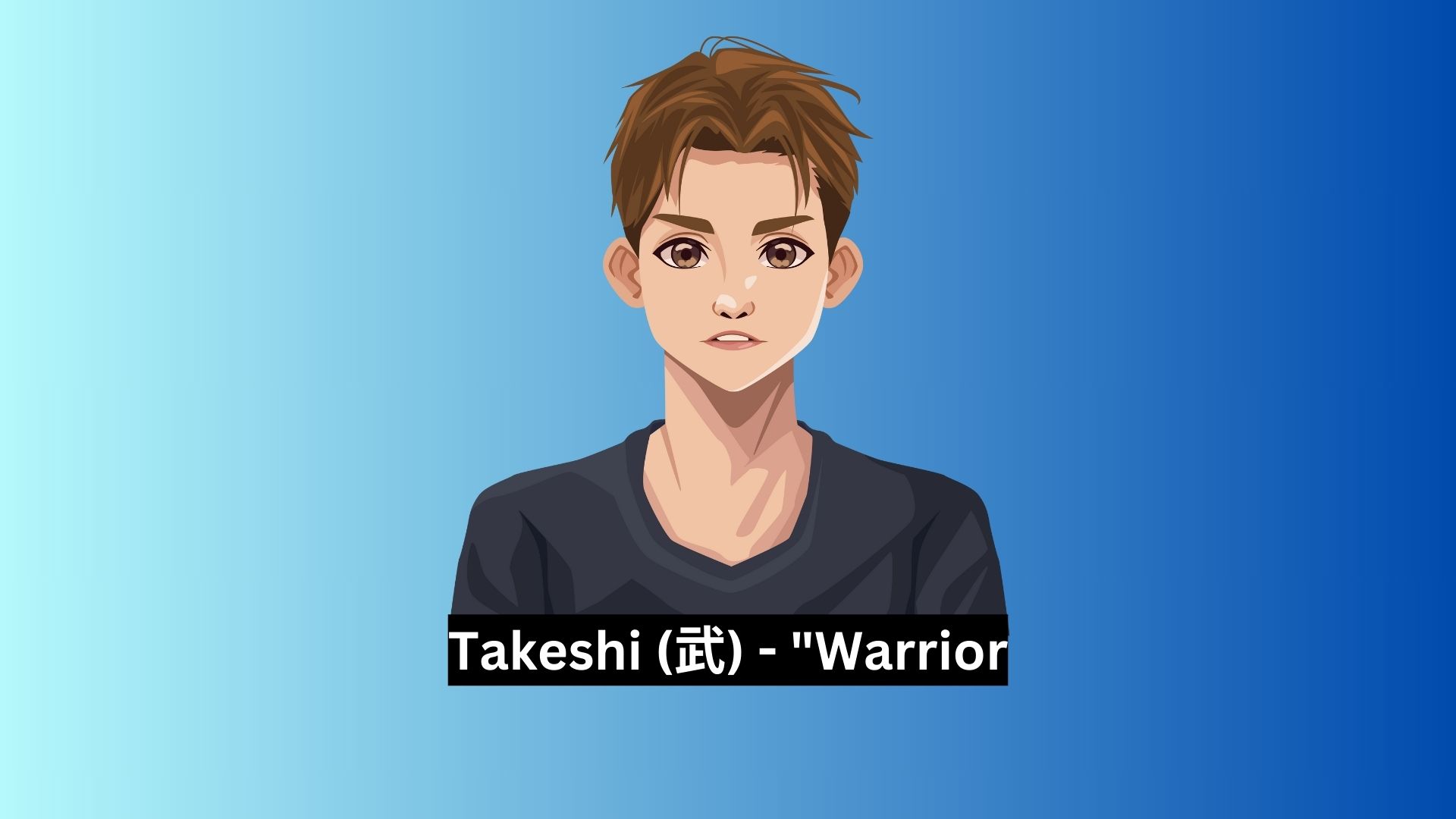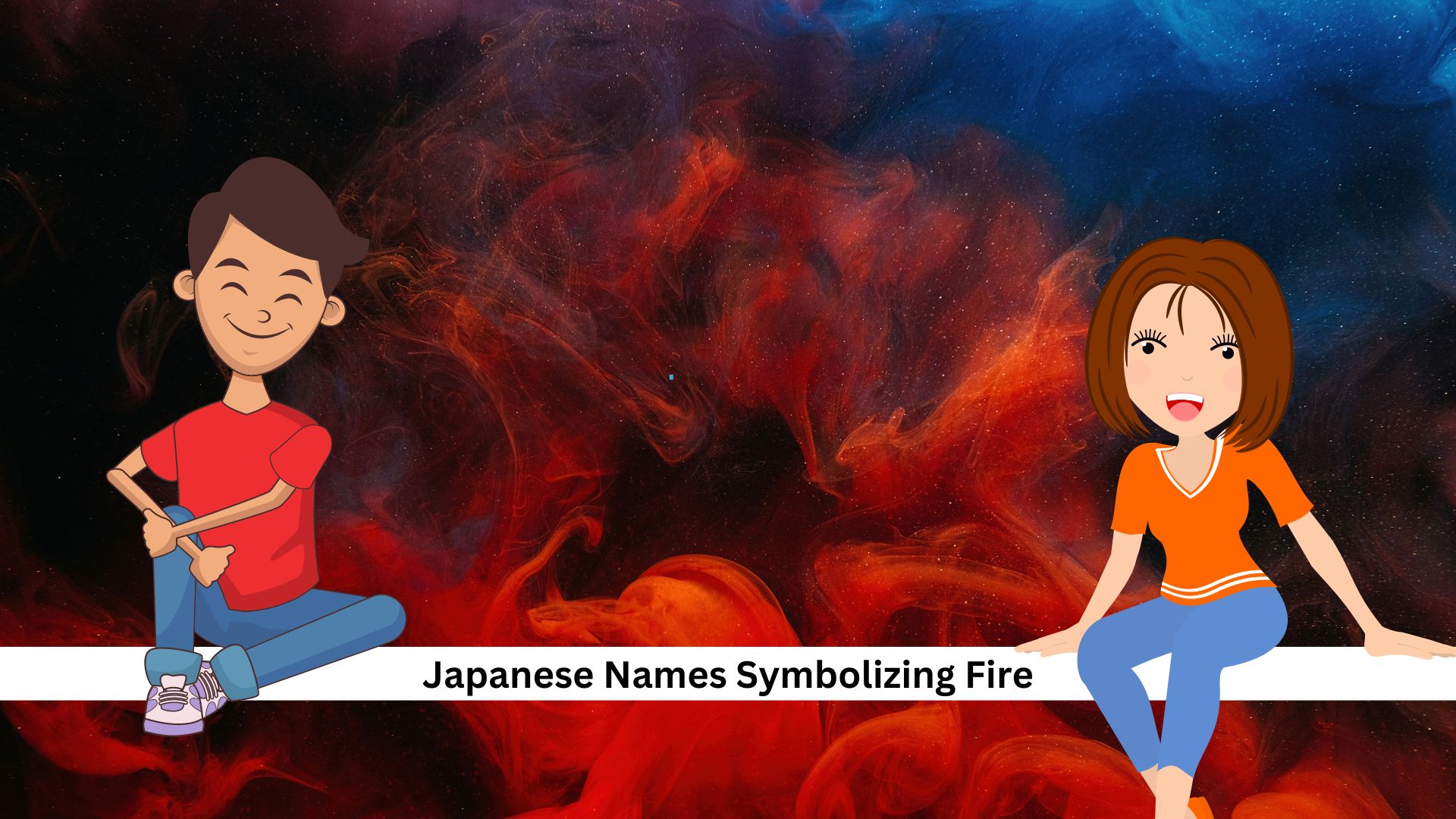Fire is a strong and meaningful symbol in Japanese culture, representing energy, passion, and change. Many Japanese names are inspired by fire, reflecting qualities like strength and a fiery spirit. These names carry a deep connection to the power and warmth that fire represents, making them unique and meaningful choices.
In this list, you’ll find 125 Japanese names that are linked to the idea of fire. Each name has its own special meaning and story, whether rooted in tradition or modern times. Whether you’re choosing a name for a child, a character, or simply exploring Japanese names, these fire-inspired options offer a wide range of possibilities that are sure to catch your interest.
125 Popular Japanese Names That Mean Fire
Female Names
In Japanese names for girls, some really capture the essence of fire. It’s all about a strong, unwavering spirit. These names show how fire inspires many aspects of Japanese culture, especially in expressing different traits through names.
- Akari (灯里) – “Light,” directly means light, symbolizing the illumination and warmth of fire.
- Hinata (日向) – “Sunflower,” symbolizing the warmth and energy of the sun, a giant ball of fire.
- Kasumi (霞) – “Mist,” symbolic of fire in its ephemeral nature, representing the fleeting and delicate presence of fire.
- Hikari (光) – “Light,” directly means light, representing the brightness of fire.
- Yoko (陽子) – “Sun Child,” combining “yo” meaning sun, and “ko” meaning child, symbolizing a person connected to the sun’s fire.
- Himari (陽葵) – “Sunflower,” combining “hi” meaning sun, and “mari” meaning sunflower, symbolizing the sun’s warmth and fire.
- Akane (茜) – “Deep Red,” directly means deep red, representing the intense color of fire.
- Kaori (香織) – “Fragrance Weaving,” symbolic of incense burning, representing the fragrant smoke of fire.
- Emi (恵美) – “Blessed Beauty,” symbolizing the beauty that fire brings.
- Natsuki (夏希) – “Summer Hope,” symbolic of the burning heat of summer, representing the intense heat and energy of fire.
- Mei (芽依) – “Bud Reliant,” indirectly symbolizing the nurturing warmth of fire that helps buds grow.
- Ayumi (歩美) – “Walk Beauty,” symbolizing the graceful movement of a dancing flame.
- Haruka (遥) – “Distant,” symbolic of a distant fire, representing the allure and mystery of a fire far away.
- Mai (舞) – “Dance,” symbolic of a dancing flame, representing the movement and energy of fire.
- Yuina (結菜) – “Bind Vegetables,” indirectly symbolizing the warmth of fire used in cooking and binding.
- Reina (麗奈) – “Lovely,” symbolic of the beauty of fire, representing the captivating nature of flames.
- Eri (恵梨) – “Blessed Pear,” indirectly symbolizing the nourishment and warmth provided by fire.
- Yuna (優奈) – “Gentle Apple Tree,” indirectly symbolizing the gentle warmth of fire that helps trees grow.

- Airi (愛梨) – “Love Jasmine,” symbolic of a burning heart, representing passion and intensity.
- Koharu (小春) – “Small Spring,” symbolic of the warmth of fire, representing the gentle warmth of early spring.
- Mio (美桜) – “Beautiful Cherry Blossom,” symbolic of fire in its fleeting beauty, representing the ephemeral beauty of cherry blossoms.
- Rina (里奈) – “Village and Apple Tree,” indirectly symbolizing the hearth fire that provides warmth and sustenance in a village.
- Sora (空) – “Sky,” symbolic of the sun, a giant ball of fire, representing the vastness and power of the sun.
- Hana (花) – “Flower,” symbolic of a burning blossom, representing the vibrant and colorful nature of fire.
- Yui (結衣) – “Bind Clothes,” indirectly symbolizing the warmth of fire that binds and protects.
- Miyu (美優) – “Beautiful Gentleness,” symbolizing the gentle warmth and beauty of fire.
- Rika (莉香) – “Jasmine Fragrance,” symbolic of incense burning, representing the fragrant smoke of fire.
- Asuka (明日香) – “Tomorrow’s Fragrance,” symbolic of the future’s burning potential, representing hope and potential.
- Sachiko (幸子) – “Happy Child,” indirectly symbolizing the warmth and joy brought by the hearth fire.
- Nana (奈々) – “Seven,” indirectly symbolizing the seven rays of light and warmth from fire.
- Misaki (美咲) – “Beautiful Blossom,” symbolic of a burning flower, representing the vibrant and fleeting beauty of fire.
- Tomoe (巴) – “Friend and Blessing,” indirectly symbolizing the warmth and companionship provided by fire.
- Riyo (梨世) – “Pear Generation,” indirectly symbolizing the nourishment and warmth of fire.
- Chiharu (千春) – “Thousand Springs,” symbolic of the warmth of fire, representing the renewal and life-giving nature of spring.
- Keiko (恵子) – “Blessed Child,” indirectly symbolizing the warmth and protection provided by fire.
- Mana (愛菜) – “Love Vegetables,” symbolic of a burning heart, representing passion and intensity.
- Rumi (瑠美) – “Lapis Lazuli Beauty,” symbolic of the glow of fire, representing the luminous beauty of fire.

- Saki (咲) – “Blossom,” symbolic of a burning flower, representing the vibrant and fleeting beauty of fire.
- Azumi (あずみ) – “Safe Residence,” symbolic of the protection and warmth of fire, representing a safe and warm home.
- Karin (花梨) – “Flower and Apple Tree,” indirectly symbolizing the nourishment and warmth provided by fire.
- Mizuki (瑞希) – “Auspicious Hope,” symbolic of a hopeful fire, representing the promise and potential of fire.
- Saya (沙耶) – “Sand and Silk,” symbolic of the ethereal nature of fire, representing the delicate and transient beauty of fire.
- Natsumi (夏美) – “Summer Beauty,” symbolic of the burning heat of summer, representing the intense energy and beauty of fire.
- Aina (愛菜) – “Love Vegetables,” symbolic of a burning heart, representing passion and intensity.
You may also like our list of 115 Japanese names that mean Moon.
Male Names
Japanese male names linked to fire often stand for strength, resilience, and the power to change. Take Kaen, which means ‘flame or blaze.’ It suggests something fierce and energetic. And Katsuki, meaning ‘victorious tree,’ captures the idea of overcoming and starting anew, just as fire clears out the old to make room for new growth.
- Kaito (火斗) – “Fire and Big Dipper,” combining “ka” meaning fire, and “to” meaning the Big Dipper, symbolizing the guiding light of the fire.
- Hinata (火向) – “Fire Facing,” combining “hi” meaning fire, and “nata” meaning facing, symbolizing turning towards the warmth and light of the fire.
- Kazuhiro (火弘) – “Fire and Broad,” combining “ka” meaning fire, and “hiro” meaning broad, symbolizing the expansive nature of fire.
- Raiden (雷電) – “Thunder and Lightning,” symbolic of fire through the intense energy and light produced.
- Haruto (火斗) – “Fire and Big Dipper,” combining “ha” meaning fire, and “to” meaning Big Dipper, symbolizing the bright guidance of fire.
- Takumi (巧) – “Artisan,” symbolic of fire in crafting, representing the essential role of fire in art and craftsmanship.
- Hikaru (光) – “Light,” directly means light, representing the illumination provided by fire.
- Akio (昭雄) – “Bright Hero,” combining “aki” meaning bright, and “o” meaning hero, symbolizing a heroic figure illuminated by fire.
- Kazuma (火馬) – “Fire Horse,” combining “ka” meaning fire, and “uma” meaning horse, symbolizing a powerful and fiery spirit.
- Satoshi (聡) – “Wise,” symbolic of enlightenment related to fire, representing wisdom gained through the light of fire.
- Haruki (春樹) – “Spring Tree,” symbolic of renewal related to fire, representing the rejuvenating power of fire.
- Tatsuya (達也) – “Accomplished,” symbolizing achievements and accomplishments that shine brightly like fire.
- Aki (火秋) – “Fire Autumn,” combining “ka” meaning fire, and “aki” meaning autumn, symbolizing the fiery colors and warmth of autumn.

- Hayato (隼人) – “Falcon Person,” symbolic of fire in its swiftness, representing the quick and fierce nature of fire.
- Ryota (涼太) – “Refreshing and Thick,” indirectly symbolizing the cooling effect after intense heat.
- Kenta (健太) – “Healthy and Thick,” indirectly symbolizing the strength and robustness provided by the warmth of the fire.
- Daiki (大輝) – “Great Radiance,” combining “dai” meaning great, and “ki” meaning radiance, symbolizing the bright and powerful light of the fire.
- Shota (翔太) – “Soaring and Thick,” indirectly symbolizing the upward movement and robust presence of fire.
- Taiga (大河) – “Big River,” symbolic of lava flow, representing the molten and fiery nature of flowing lava.
- Atsushi (篤志) – “Earnest,” symbolic of burning passion, representing intense dedication and fervor.
- Yuji (裕司) – “Abundant and Rule,” indirectly symbolizing the wealth and power associated with the warmth and light of fire.
- Taro (太郎) – “Big Son,” indirectly symbolizing the primary and prominent presence, much like a strong fire.
- Masaru (勝) – “Victory,” symbolic of a burning spirit, representing the passionate and victorious nature of fire.
- Yamato (大和) – “Great Harmony,” symbolic of burning unity, representing the cohesive and unifying power of fire.
- Jiro (次郎) – “Second Son,” indirectly symbolizing a secondary yet essential presence, like a companion fire.
- Nobu (信) – “Trust,” symbolic of burning faith, representing the steadfast and enduring nature of fire.
- Shinobu (忍) – “Endurance,” symbolic of enduring fire, representing resilience and persistence like a lasting flame.
- Toru (徹) – “Clear,” symbolic of a clear flame, representing the purity and transparency of fire.
- Mitsuo (光男) – “Shining Man,” combining “mitsu” meaning shining, and “o” meaning man, symbolizing a person radiating with the light of the fire.
- Kenji (健二) – “Healthy Second Son,” indirectly symbolizing the robust and supportive nature of a warming fire.
- Takeshi (武) – “Warrior,” symbolic of burning courage, representing the fierce and brave spirit of a warrior like fire.

- Yuto (悠斗) – “Leisurely Big Dipper,” indirectly symbolizing a guiding light that provides comfort and direction, like fire.
- Ryusei (流星) – “Shooting Star,” symbolic of a fiery comet, representing the bright and fleeting presence of a shooting star.
- Hiroki (宏樹) – “Great Tree,” symbolic of a burning tree, representing the strength and grandeur of a tree that can burn brightly.
- Tadashi (正) – “Correct,” indirectly symbolizing the guiding light of the fire that shows the right path.
- Hibiki (火響) – “Fire Sound,” combining “hi” meaning fire, and “biki” meaning sound, symbolizing the crackling and roaring of fire.
- Rei (火零) – “Fire Zero,” combining “hi” meaning fire, and “rei” meaning zero, symbolizing the potential and beginning of the fire.
- Nori (火典) – “Fire Rule,” combining “hi” meaning fire, and “nori” meaning rule, symbolizing the guiding principles like the light of fire.
- Shin (火真) – “True Fire,” combining “hi” meaning fire, and “shin” meaning true, symbolizing the pure essence of fire.
- Goki (剛輝) – “Strong Radiance,” combining “go” meaning strong, and “ki” meaning radiance, symbolizing the powerful and bright nature of fire.
- Makoto (真火) – “True Fire,” combining “ma” meaning true and “koto” meaning fire, representing the authentic and pure nature of fire.
- Hoshiko (星火) – “Star Fire,” combining “hoshi” meaning star, and “ko” meaning fire, symbolizing the small yet bright fire of a star.
- Toshiro (俊郎) – “Talented Son,” indirectly symbolizing burning talent, representing a person with outstanding abilities like a bright flame.
- Jin (仁火) – “Compassion Fire,” combining “jin” meaning compassion, and “hi” meaning fire, symbolizing the warmth and kindness of a compassionate heart.
Also check out our list of Japanese names that mean Blood.
Unisex Names
Unisex Japanese names often relate to fire, capturing its essence and energy. Take ‘Hinata,’ meaning ‘facing the sun.’ It reflects the warmth and life that fire brings. These names aren’t just about the meanings. They also embody qualities like warmth, brightness, and renewal, which are central to Japanese naming traditions.
- Asahi (旭) – “Morning Sun,” directly means morning sun, symbolizing the warmth and light of the sun, akin to fire.
- Hibiki (響) – “Sound,” symbolic of the crackle of fire, representing the audible presence of burning flames.
- Akira (明) – “Bright,” directly means bright, symbolizing the illumination and radiance of fire.
- Mio (澪) – “Waterway,” symbolic of the flow of lava, representing the fluid and powerful nature of molten rock.
- Haruka (春香) – “Spring Fragrance,” symbolic of the renewal of fire, representing the fresh and rejuvenating energy of spring.
- Yuuki (優希) – “Gentle Hope,” indirectly symbolizing the comforting and hopeful warmth of fire.
- Rin (凛) – “Dignified,” symbolic of the majestic nature of fire, representing its grandeur and commanding presence.
- Nao (直) – “Honest,” symbolic of a clear flame, representing the straightforward and pure nature of fire.
- Makoto (誠) – “Sincerity,” symbolic of the true nature of fire, representing honesty and authenticity.
- Kaoru (薫) – “Fragrance,” symbolic of incense burning, representing the soothing and aromatic smoke of fire.
- Aoi (葵) – “Hollyhock,” symbolic of a burning flower, representing the vibrant and ephemeral beauty of fire.
- Haru (春) – “Spring,” symbolic of renewal, related to fire, representing new beginnings and warmth.
- Kyo (京) – “Capital,” symbolic of the burning center of culture, representing the lively and central importance of fire.
- Rei (零) – “Zero,” symbolic of the cyclical nature of fire, representing the endless cycle of creation and destruction.
- Hinata (日向) – “Sun Facing,” directly means sun facing, symbolizing the warmth and light of the sun, akin to fire.

- Shin (真) – “True,” symbolic of true fire, representing the pure and authentic nature of fire.
- Yuu (優) – “Gentle,” indirectly symbolizing the gentle and comforting warmth of fire.
- Aki (秋) – “Autumn,” symbolic of the warmth of fire, representing the cozy and vibrant colors of autumn.
- Michiru (満) – “Full,” symbolic of the fullness of fire, representing its complete and encompassing presence.
- Nari (成) – “Success,” symbolic of the burning passion for achievement, representing the drive and determination fueled by fire.
- Ryouma (龍馬) – “Dragon Horse,” symbolic of fiery spirit, representing the powerful and dynamic nature of fire.
- Sae (冴え) – “Clear,” symbolic of a clear flame, representing the clarity and purity of fire.
- Shizuka (静香) – “Quiet Fragrance,” symbolic of the subtlety of fire, representing the gentle and calming presence of a controlled flame.
- Tomomi (智美) – “Wise Beauty,” symbolic of the wisdom of fire, representing the enlightening and beautiful nature of fire.
- Yori (頼) – “Trust,” symbolic of the burning faith, representing the steadfast and reliable nature of fire.
- Jun (潤) – “Moisture,” symbolic of the balance of fire, representing the harmonious coexistence of fire and water.
- Ryo (良) – “Good,” indirectly symbolizing the beneficial and positive aspects of fire.
- Sho (翔) – “Soar,” symbolic of the rising flames, representing the upward movement and aspiration fueled by fire.
- Kohaku (琥珀) – “Amber,” symbolic of fire in its glow, representing the warm and golden light of fire.
- Masaki (正樹) – “Just Tree,” symbolic of a burning tree, representing the strength and justice associated with fire.
- Shizuku (雫) – “Drip,” symbolic of the balance of fire, representing the harmonious coexistence of fire and water.
- Kiyoshi (清) – “Pure,” symbolic of a pure flame, representing the clarity and cleanliness of fire.

- Satori (悟り) – “Enlightenment,” symbolic of the light of fire, representing the wisdom and understanding brought by fire.
- Yamato (大和) – “Great Harmony,” symbolic of the unity of fire, representing the cohesive and harmonious nature of fire.
- Noriaki (範明) – “Shining Rule,” symbolic of the guiding light of fire, representing leadership and illumination.
- Toshiko (俊光) – “Talented Light,” symbolic of the brilliance of fire, representing exceptional talent and brightness.
- Yoriko (頼子) – “Trust Child,” symbolic of the dependable nature of fire, representing reliability and faith.
- Akio (明男) – “Bright Man,” symbolic of the radiance of fire, representing a person with a bright and shining personality.
- Hideo (秀男) – “Excellent Man,” symbolic of the excellence of fire, representing a person with outstanding qualities.
- Mitsuru (充) – “Full,” symbolic of the completeness of fire, representing the all-encompassing nature of fire.
Conclusion
Exploring 125 Japanese names tied to the element of fire really opens our eyes to how important this element is in Japanese culture. These names reflect deep themes like passion, renewal, and purification. They connect people to nature and the wisdom of ancestors. Naming like this isn’t just about identity; it keeps cultural traditions alive, showing us how vital fire is in both personal lives and the wider community, especially in practices related to Shinto and Buddhism.
Don’t forget to share this article of The Jeep Diva with your friends who are looking for name ideas!

Fahmea Shorok is a well-traveled writer who focuses on entertainment journalism. Her work reflects her journeys and showcases her flexible writing style. She explores local art scenes wherever she goes, giving her readers a close look at the entertainment found around the world in theaters, movies, and art galleries.

